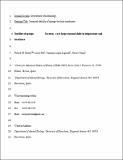Por favor, use este identificador para citar o enlazar a este item:
http://hdl.handle.net/10261/57037COMPARTIR / EXPORTAR:
 SHARE SHARE
 CORE
BASE CORE
BASE
|
|
| Visualizar otros formatos: MARC | Dublin Core | RDF | ORE | MODS | METS | DIDL | DATACITE | |

| Título: | Stability of Sponge-Associated Bacteria over Large Seasonal Shifts in Temperature and Irradiance |
Autor: | Erwin, Patrick M. CSIC ORCID; Pita, Lucía CSIC ORCID ; López-Legentil, S.; Turon, Xavier CSIC ORCID | Fecha de publicación: | 2012 | Editor: | American Society for Microbiology | Citación: | Applied and Environmental Microbiology 78(20) : 7358-7368 (2012) | Resumen: | Complex microbiomes reside in marine sponges and consist of diverse microbial taxa, including functional guilds that may contribute to host metabolism and coastal marine nutrient cycles. Our understanding of these symbiotic systems is based primarily on static accounts of sponge microbiota, while their temporal dynamics across seasonal cycles remain largely unknown. Here, we investigated temporal variation in bacterial symbionts of three sympatric sponges (Ircinia spp.) over 1.5 years in the northwestern (NW) Mediterranean Sea, using replicated terminal restriction fragment length polymorphism (T-RFLP) and clone library analyses of bacterial 16S rRNA gene sequences. Bacterial symbionts in Ircinia spp. exhibited host species-specific structure and remarkable stability throughout the monitoring period, despite large fluctuations in temperature and irradiance. In contrast, seawater bacteria exhibited clear seasonal shifts in community structure, indicating that different ecological constraints act on free-living and on symbiotic marine bacteria. Symbiont profiles were dominated by persistent, sponge-specific bacterial taxa, notably affiliated with phylogenetic lineages capable of photosynthesis, nitrite oxidation, and sulfate reduction. Variability in the sponge microbiota was restricted to rare symbionts and occurred most prominently in warmer seasons, coincident with elevated thermal regimes. Seasonal stability of the sponge microbiota supports the hypothesis of host-specific, stable associations between bacteria and sponges. Further, the core symbiont profiles revealed in this study provide an empirical baseline for diagnosing abnormal shifts in symbiont communities. Considering that these sponges have suffered recent, episodic mass mortalities related to thermal stresses, this study contributes to the development of model sponge-microbe symbioses for assessing the link between symbiont fluctuations and host health. | Descripción: | 11 páginas,5 figuras, 4 tablas. | Versión del editor: | http://dx.doi.org/10.1128/AEM.02035-12 | URI: | http://hdl.handle.net/10261/57037 | DOI: | 10.1128/AEM.02035-12 | ISSN: | 0099-2240 | E-ISSN: | 1098-5336 |
| Aparece en las colecciones: | (CEAB) Artículos |
Ficheros en este ítem:
| Fichero | Descripción | Tamaño | Formato | |
|---|---|---|---|---|
| Erwin et al postprint2.pdf | 1,14 MB | Adobe PDF |  Visualizar/Abrir |
CORE Recommender
Page view(s)
323
checked on 24-abr-2024
Download(s)
281
checked on 24-abr-2024
Google ScholarTM
Check
Altmetric
Altmetric
NOTA: Los ítems de Digital.CSIC están protegidos por copyright, con todos los derechos reservados, a menos que se indique lo contrario.
